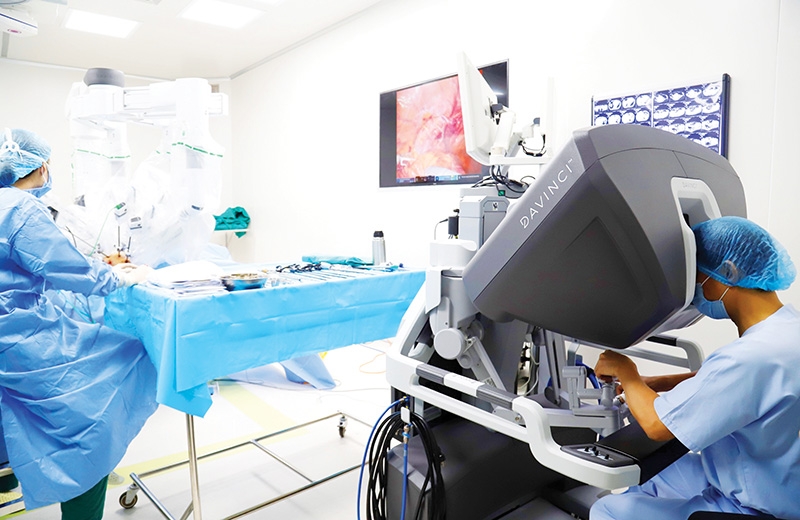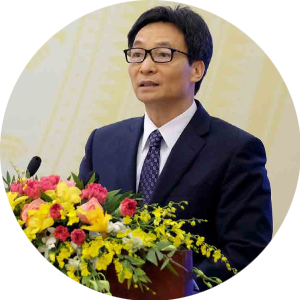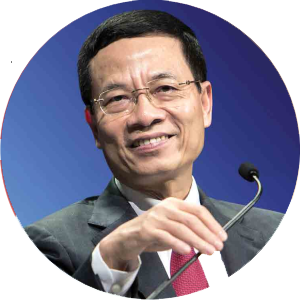Digital healthcare to create motivation for investment
 |
| Vietnamese healthcare facilities aim to digitalise their operations for efficiency and convenience |
Minister of Health Nguyen Thanh Long said at last week’s E-Health Vietnam Summit that the ministry (MoH) has submitted a decree on private investment attraction in the sector, with IT being a key focus.
When the decree is issued, businesses will get incentives for their ventures, especially in technology development.
“The sector commits to continue cutting 30 per cent of administrative procedures in the coming time, while increasing transparency in health declaration,” Long said.
The move will create a great motivation for businesses to make investment in the lucrative sector, especially in IT applications.
In addition to this, more fresh opportunities are expected to come as the MoH on December 22 issued the Health Digital Transformation Programme by 2025, with a vision towards 2030, in line with the National Digital Transformation Programme for the period.
The sector aims to apply digital technologies in almost all activities and services by the end of the decade, thus developing smart healthcare focusing on smart health prevention, smart diagnosis, and smart administration.
Specifically, by 2025, all healthcare facilities will apply electronic non-cash payment, as well as be connected with the sector’s telehealth system, among other targets.
The sector also aims to have 15 per cent, or about 210 hospitals nationwide, succeed in digital transformation in the same timeframe, with the rate to increase to 50 per cent by 2030.
Experts said that in telehealth development, key players like Viettel Solutions, VMED Group, VNPT, FPT, and Isofth will be the top beneficiaries in this trend. They are focusing on development of new IT solutions for telehealth at health facilities, applying digital technologies of Industries 4.0 such as AI, the Internet of Things, and big data.
At the E-Health Vietnam Summit, three smart health platforms were officially launched in the form of personal health records, the Vietnam Health Connectivity Network, and V20 – information management for grassroots health facilities.
In the wake of future growth potential, smaller groups are also making moves to benefit from growing digital demands. Hospital software tester TPH Solutions, which was established in 2015, is one such group working on big plans. Director Mai Minh Kiet told VIR, “We have a plan to work with partners to expand our operations in the field. We will also develop more new applications on mobile phone to enable hospitals’ expansion in a smart manner.”
Kiet added that in 2021, TPH Solutions will develop a mobile phone and web-enabled solution to enable connectivity among labs and health facilities. “We will continue to develop software on vaccination, connecting with the national vaccine system,” he added. “We will also venture further afield into the international market.”
International technology firms and pharma giants are not an exception in this tendency. Ericsson, Lenovo, Qualcomm, AWS, and Keysight Technologies are continuing to introduce new products, while Novartis, GSK, Sanofi, and AstraZeneca are also moving digitalisation quickly there.
| Vu Duc Dam - Deputy Prime Minister
To tap into the opportunities from Industry 4.0, we have to determine to accelerate IT application in every corner of life. This is first to increase transparency and to ensure accountability of all healthcare facilities, and then towards accountability among health staff to patients and the whole society. It needs to solve issues related to IT application costs of machines, software, and training, and the threshold for medical devices and materials used for medical diagnosis and treatment. Most important in digital transformation is to solve practical problems. First of all is to serve management and administration work of the health sector in terms of staff, medical devices, machines, materials, drugs and others at each hospital and other healthcare facilities. The healthcare sector should increase people’s confidence so that they do not have to rush to central-level hospitals. And with technology and digital transformation, we can do this and develop faster. Nguyen Thanh Long - Minister of Health
The goal of serving people better and creating more utilities in the care and protection of people’s health is very important. Therefore, the healthcare sector has implemented a series of programmes and plans to accelerate the digital transformation. In 2020, the Ministry of Health was one of two ministries that achieved 100 per cent of online public services at level 4, connecting with the National Public Service Portal. During COVID-19, the ministry built the telehealth system, making it a bright spot. We are striving to improve quality of diagnosis and treatment, narrowing the gap among regions – and telehealth can help realise this target. By the end of 2020, over 1,500 medical facilities were connected to the entire route, including those in remote areas and islands, thus enabling people being treated at grassroots facilities to access better healthcare quality. We aim to increase the figure to 100 per cent of health facilities, including private-run ones, by 2025. By 2021, every outpatient will also have electronic medical records, starting from July 2021. The V20 platform – aimed to manage information for grassroots health facilities – will be applied from this month, and paperwork gradually removed. Nguyen Manh Hung - Minister of Information and Communications
Health and education are the two first prioritised sectors in the national digital transformation programme because they have relations with most people, the widest impact, and the highest state spending. They are also the foundation for a developed country. In the healthcare sector, digital technologies are often used with patients being the focus. The models and methods to supply health services are also changing. As such, databases which have been left out for years will now become a valuable asset and resource, creating new value. Healthcare has been mainly funded by the state, but the sector now has resources from businesses, including digital startups. Digital healthcare is able to deal with the problems of the sector for all people. This is the biggest dream of humankind, and digital transformation can help realise this. |
What the stars mean:
★ Poor ★ ★ Promising ★★★ Good ★★★★ Very good ★★★★★ Exceptional
Themes: Healthcare Platform
- Hanoi intensifies airport monitoring amid Nipah disease risks
- Cosmetics rules set for overhaul under draft decree
- Policy obstacles being addressed in drug licensing and renewal
- Sanofi, Long Chau Pharmacy relaunch medicine blister pack collection initiative
- Takeda Vietnam awarded for ongoing support of Vietnam’s sustainability efforts
Related Contents
Latest News
More News
- Foreign leaders extend congratulations to Party General Secretary To Lam (January 25, 2026 | 10:01)
- 14th National Party Congress wraps up with success (January 25, 2026 | 09:49)
- Congratulations from VFF Central Committee's int’l partners to 14th National Party Congress (January 25, 2026 | 09:46)
- 14th Party Central Committee unanimously elects To Lam as General Secretary (January 23, 2026 | 16:22)
- Worldwide congratulations underscore confidence in Vietnam’s 14th Party Congress (January 23, 2026 | 09:02)
- Political parties, organisations, int’l friends send congratulations to 14th National Party Congress (January 22, 2026 | 09:33)
- Press release on second working day of 14th National Party Congress (January 22, 2026 | 09:19)
- 14th National Party Congress: Japanese media highlight Vietnam’s growth targets (January 21, 2026 | 09:46)
- 14th National Party Congress: Driving force for Vietnam to continue renewal, innovation, breakthroughs (January 21, 2026 | 09:42)
- Vietnam remains spiritual support for progressive forces: Colombian party leader (January 21, 2026 | 08:00)




 Tag:
Tag:



















 Mobile Version
Mobile Version